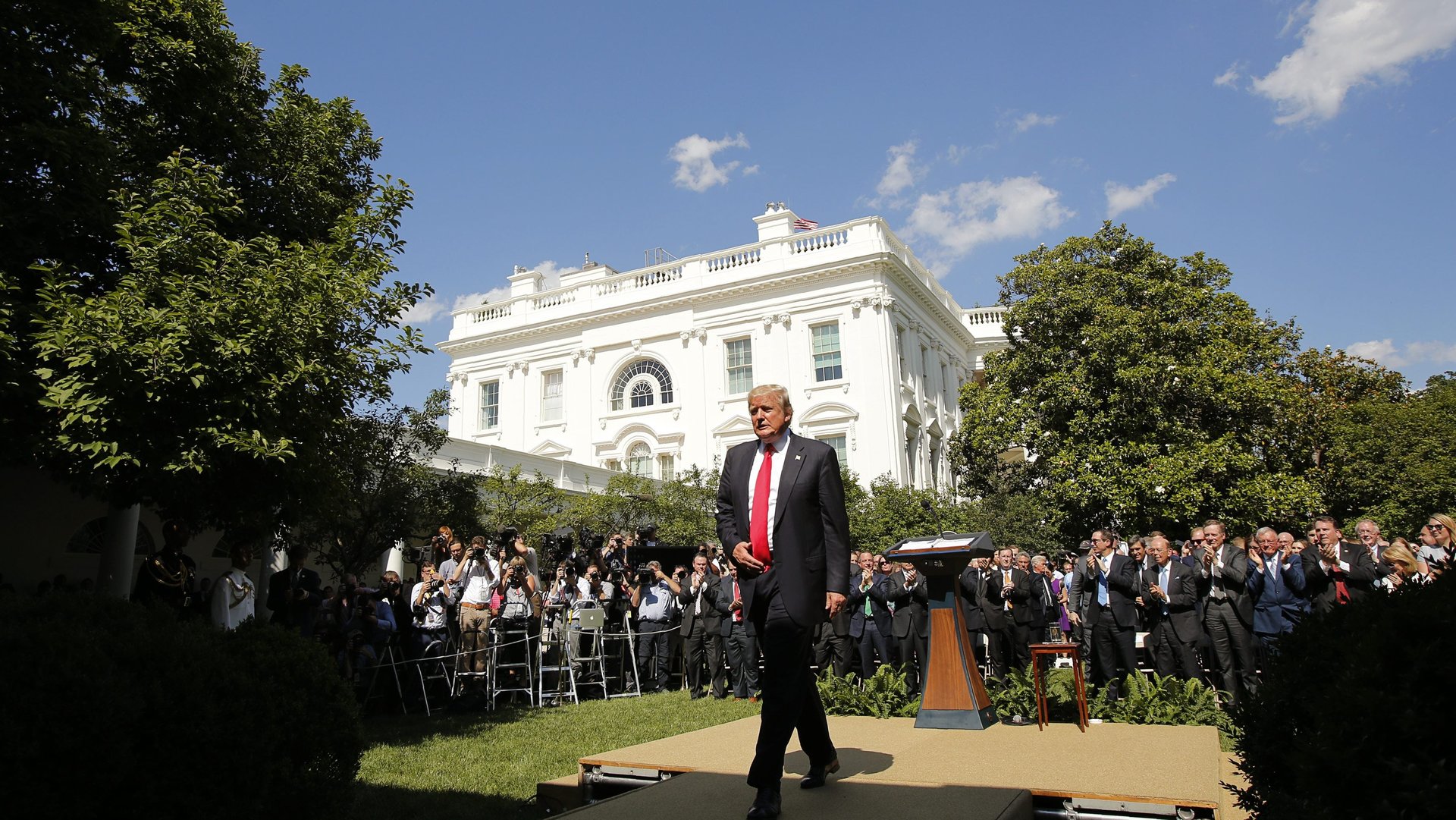The idyllic, surreal scene in the Rose Garden as Trump edged the world closer to climate disaster
It was a beautiful day for destroying the planet.


It was a beautiful day for destroying the planet.
A bright sun shone down on the White House Rose Garden. The lawn was lush and trimmed with crab-apple trees and beds of flowers.The temperature was a balmy 82°F (28°C)—a typical June day in Washington, DC. Outside the gates, women in pink t-shirts protested in favor of Planned Parenthood. Inside, as the invited guests trickled in, the military band played Gershwin: “Summertime, and the livin’ is easy.” A spokeswomen in a short, sleeveless lavender dress pointed young, clean-cut, mostly male VIPs to their seats in a roped-off area in front of the podium.
Trump was late. The waiting TV reporters were forced to do stand-ups in the sunshine front of the press row, telling their listeners about the historic announcement that the president was almost certainly, eventually, going to make—if he had not, at the last minute, changed his mind. Sweat forced its way through their make-up and beaded on their brows. The band started playing “Turn your love around,” a George Benson song from the early 1980s.
Then, suddenly, there was vice-president Mike Pence.
With open arms, Pence greeted the guests. “On behalf of the First Family, welcome to the White House.” Being vice president under Trump is the “greatest privilege of my life,” he said in perfectly modulated tones. “Thanks to president Donald Trump,” he went on, and a half-smile played across his lips, “America is back.”
Trump strode up to the podium, his thatch of blond hair glowing in the sunlight.
His speech at first took a familiar route, cycling through the highlights of his overseas trip and the strength of the US stock markets before landing on what the audience was here for—his decision on the US’s role in the Paris Accord. The agreement in 2015 brought nearly 200 countries together in the world’s most ambitious pledge to cut greenhouse gases, in an attempt to slow the global warning that is expected to put many parts of US coasts underwater by 2100.
“The United States will withdraw. From the Paris. Climate. Accord,” Trump said, taking dramatic pauses, and savoring the sustained applause from the VIP section. “But,” he said, not immediately, or cleanly. “We will start to negotiate, and we will see if we can make a deal that’s fair,” he said. “And if we can, that’s great. And if we can’t, that’s fine.”
The great dealmaker carried on, sprinkling his speech with factual errors—the US will continue to be “the cleanest and most environmentally friendly country on Earth,” for example (it ranks 26th in Yale University’s Environmental Performance Index), and there is a tax bill “moving through Congress” (one has not yet been written). Some members of the audience wrinkled their brows in puzzlement. Still, the applause from the VIP section was polite and on time.
As Trump stepped away from the podium, a reporter yelled “Do you believe in climate change?” Trump didn’t answer. The military band began to play again.
In the White House press room afterward, two officials from the president’s cabinet took reporters’ questions, on the condition that they not be quoted by name.
The president is “very intent on renegotiating and coming out with a better deal for the American worker,” said one. “That is sincere,” he said. But no, they couldn’t give any details about how the negotiations would work, what was going to be negotiated, or what the US’s ultimate goals were.
The president does intend, they added, to follow the agreement’s legal rules about withdrawal. (Those say that US can’t actually leave until Nov. 4, 2020—a day after the next presidential election.)
Asked about a just-issued joint statement by the leaders of France, Germany and Italy saying that the Paris agreement couldn’t, in fact, be renegotiated, the officials seemed taken aback. There were other “issues,” besides the agreement, that could be renegotiated, one said, but he couldn’t name any.
Does the president believe in climate change? They weren’t sure. One of the officials indicated that he had never asked.
As the press conference wrapped up, a crowd continued to burble outside the White House gates. The Planned Parenthood protestors were dispersing, but climate protestors, hastily-scrawled signs in hand, had arrived on to the scene.